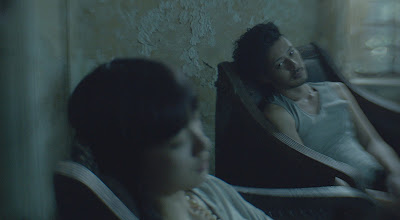Twenty years on since the hand-over of Hong Kong from British rule to
China with a fifty year period of autonomy until 2047 and a number of films
have been made regarding the anxieties faced by the natives, notably Wong
Kar-wai's Cannes-winning "Happy Together". Recent times have seen a
growing number of films along these lines - some subversive, others looking
more at the practicalities - alongside periods of protest at the impending loss
of a way of life.
Jenny Suen's debut feature is along the subversive lines, teaming-up
with Wong's cinematographer on "Happy Together", Christopher Doyle. Set
around the last fishing village in Hong Kong, to summarise the plot for
"The White Girl" is difficult. The characters largely nameless, the
titular "The White Girl" (Angela Yuen) is a student in a class of
various ages. Living with her father, a fisherman, she is treated as his
servant and told she is allergic to sunlight, like her estranged mother, whose
whereabouts are unknown. A singer who made some recordings, she listens to her
mother's songs, asking her father as to her story; something he's unwilling to
discuss.
Wandering at night when she feels safer to go out, she spends her time
at a bay in her underwear, where she meets an equally enigmatic Japanese man
(Joe Odagiri), who is living in a watch tower above the village where he is
able to project images from the village on to a wall. The Japanese himself
befriends a local boy (Jeff Yiu) who helps him set-up his new home.
While these three loaners meet, the local "Village Chief" is
making secret plans with a trio from mainland China to bulldoze and concrete
the tiny fishing port and build new luxury apartments and entertainment
complexes. However, only a limited amount of time is dedicated to the
development of this story. Instead, the main focus is on the chance encounters
between the three leads and their slow meanders around the village.
There are a number of problems with this film, but let's start with the
positives. As you'd expect with cinematography from co-director Christopher
Doyle, there are some very interesting shots of blurred focus against
dilapidated backdrops. But herein lies a problem. Audiences will no doubt be
attracted to Doyle as cinematographer, but working with a complex narrative
with a novice director, these shots simply become a pretty visual to overall
confusion.
Working with more established directors, Doyle's camerawork is an
enhancement of well-constructed filmmaking and storytelling. But having less
experience, Suen is unable to construct these shots into a cohesive narrative.
Doyle himself a relative novice as a director - limited to documentary,
segments and the challenging watches of "Away with Words" and
"Warsaw Dark" - is unable to provide mentoring for cohesion either.
The emphasis seems to be on the cinematography over the storytelling:
the two leads moving at a slow pace whenever on screen together; their
communicating in broken English slow and awkward, with a script that offers few
explanations either. As such, much of the film has the surface-level enigma of
a fragrance commercial, with meaning left open and little in the way of depth
within the characters, with only hints ever provided as to "The White
Girl's" story.
Perhaps there are too many ideas working at once here, creating
confusion, leaving the audience to wonder if this symbolises that, and that
symbolises this. While open ends are always welcome, as there are many ideas,
each not fully explored, there are simply too many things to consider, leaving
little satisfaction by the film's conclusion. The "Village Chief" and
his companions accompanied by music harking back to comedy from the Seventies
and Eighties feels out-of-place alongside the slow nature of the rest of the
film, and further this sense.
You can see some of the ideas at play here, but over-indulgence has
hindered their impact. Perhaps working alongside other young directors, fully
developing one of the concepts as a short, à la "Ten Years" would
have been a better way to tell the story. As such, "The White Girl"
will have limited appeal; something of a pretty mess.









